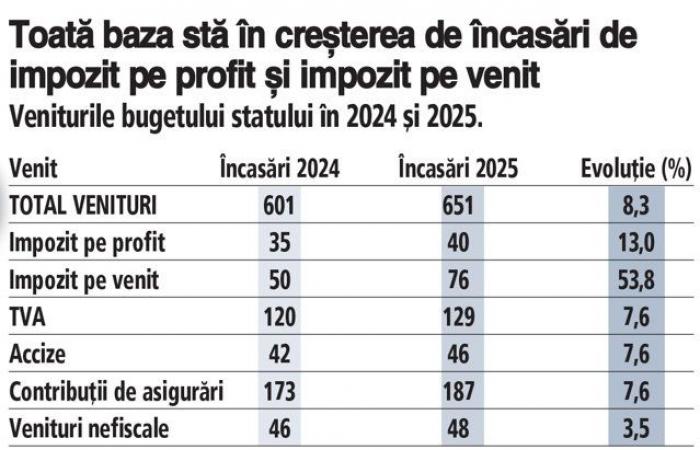♦ The new government, formed following the December 1 vote, is to take over the Executive, but it is not known when, because the parliamentary elections have not yet been validated by the Constitutional Court. Thus, the budget, which is usually the most important law of the year, is not part of any discussion at this time ♦ There are, however, indications of how it will look, because, according to the agreement with the European Commission, Romania must follow a plan to reduce the budget deficit.
Do taxes go up or not go up in 2025? What will the pension increases look like, if there will be any, and what will the public investments be? These are questions to which there is no answer at the moment, in the absence of a state budget. Now, less than a month before the end of the year, the discussions in the parliament and in the government are about the formation of majorities that can give the new government. Romania’s budget, which is usually the most important law of the year, remained in the background.
“Let’s not forget the budget for 2025. We will have some problems there. The deficit is neither 5% – as was provided for in the state budget law for 2024, nor 6.9% of GDP, as provided for after the rectification. Not even 7.9% GDP, as estimated by the Commission. It will go towards 9% GDP”, says Gabriel Biriş, business lawyer and former secretary of state in the Ministry of Finance.
The European Commission recently approved the Medium Term Structural Budget Plan (MBSTM), for which the Ciolacu government negotiated in Brussels in 2024. Practically, the plan foresees the gradual reduction of the budget deficit, over a period of seven years, from 7.9% in 2024, to below 3% in 2031. At 10 months of the year, the budget deficit is 6.2% of GDP and it is not clear whether, until at the end of the year, it will close below 8%, given that, traditionally, almost half of the deficit is added in the last two months of the year, when the budgets of ministries and local administrations are balanced. Given that one cannot talk about drawing up the budget until the formation of the new government, the only indications about the budget are in the PBSTM, especially in the context in which the plan received the green light from the European Commission.
Thus, revenues would increase by 8%, at a real economic growth, without inflation, of 2.8%. 20205 will be a complicated year, for the budget and for the economy, and the economic growth of 2.8% means that the business must rev its engines. Or, this means that the western market will break down, first of all, but, at least at this moment, there are no news in this regard. If the economy will not help budget revenues, the only realistic option is to raise taxes, especially VAT, so that revenues increase.
The situation on the expenditure side is more complicated, because the pressure of the spring elections still remains. With an elected president, the new government could have taken measures to slow down spending, without being affected electorally. In the situation where the presidential elections will be restarted from scratch, after the invalidation of the first round, the concrete measures to slow down the expenses are faced with the possibility that a candidate of the pro-European bloc, who would enter the second round, will be affected by unpopular measures .
According to the commitment to the European Commission, however, state spending would increase by only 6% in 2025, so that, at the end of the year, the budget deficit would decrease by 7 billion. lei and reach 133 billion, i.e. 7% of the GDP of 1,904 billion. lei.
Romania’s plan to reduce the budget deficit over a period of seven years was approved by the European Commission
The plan to reduce the budget deficit over a period of seven years was approved by the European Commission. According to the document, Romania’s budget deficit, i.e. the difference between revenues and expenses, would decrease from almost 8% in 2024, gradually, to below 3% of GDP in 2031. “In general, the Commission considers that Romania’s plan meets the requirements EU regulation. In accordance with Article 17 of Regulation (EU) 2024/1263, the net spending trajectory as set out in the plan should be recommended by the Romanian Council, and the set of reforms and investments supporting the extension of the adjustment period to 7 years should be supported”, write the representatives of the European Commission, in a document about Romania’s plan.
Basically, it is about increasing revenues through the fiscal reform of eliminating fiscal exceptions – such as the income tax exemption – lowering the threshold for micro-enterprises, increasing royalties and operationalizing the Neptun Deep gas field. On the expenditure side, according to the plan, they would not be cut, but rather the growth would be slowed down, so that, as a share in the GDP, it would decrease. Other measures, at least in the document published by the Ministry of Finance, are not clearly specified.
Although approving the document, the Commission recommends the Romanian government to ensure that the increase in net spending does not exceed the established maximums and to implement the set of reforms and investments that support the extension of the fiscal adjustment period to 7 years, as established in Annex II to this Recommendation, until the indicated deadlines.
For other news, analyses, articles and business information in real time, follow Ziarul Financiar on WhatsApp Channels







